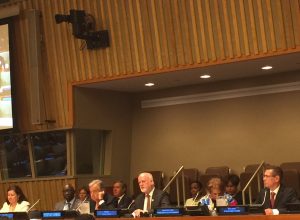As delivered
Remarks by H.E. Mr. Peter Thomson, President of the 71st Session of the General Assembly, at General Assembly Informal Interactive Dialogue on the Responsibility to Protect ‘The Responsibility to Protect and Accountability for Prevention’
6 September 2017
Excellencies,
Distinguished guests,
Ladies and Gentlemen,
Welcome to this year’s informal interactive dialogue of the General Assembly on the Responsibility to Protect. We are gathered in this hall because of one fundamental founding reason; namely that we the peoples of the United Nations are determined to ‘save succeeding generations from the scourge of war’.
For over seven decades now, Member States have worked together to deliver on that founding objective, striving to protect the lives of innocent civilians from war and mass atrocity crimes.
You may recall that at the 2005 World Summit, world leaders united around this subject, declaring that “each individual State has the responsibility to protect its populations from genocide, war crimes, ethnic cleansing, and crimes against humanity” and that the international community should help States to exercise this basic responsibility.
In the years that have followed that historic declaration, the world has seen the principle of the Responsibility to Protect invoked to help prevent egregious violations of international human rights and humanitarian law, to save vulnerable populations from imminent danger, to strengthen accountability for violations as a critical deterrent, and to help build the capacity of nations to prevent mass atrocity crimes.
Despite these life-saving achievements, too often, the responsibility to protect doctrine has not been realised. Identifiable precursors that risk leading to atrocity crimes have often not been mitigated in time, with dire consequences.
For a variety of reasons, some States have found themselves either unwilling or unable to fulfil their respective and collective responsibilities to protect.
It is thus that the theme of this year’s informal interactive dialogue on ‘accountability for prevention’ is so apt.
While the Responsibility to Protect calls upon States to take appropriate and necessary measures to prevent atrocity crimes; to seek international support when they do not have adequate capacity; and for the international community to assist States when requests are received, accountability for failures to act has for too long been overlooked.
These failures by Governments include a lack of commitment to transparent and accountable State institutions based on good governance, human rights, and rule of law, thereby allowing, in some cases, the commission of atrocity crimes.
They include States ignoring early warning signs, failing to disavow acts of incitement, and not responding to rising social tensions and violence.
And they include failures by the international community to respond effectively to countries’ requests to help fill protection gaps and address situations of risk, all of which has led to the devastating and preventable loss of innocent lives.
The importance of strengthening legal, political, and moral accountability for prevention is clear – not only to improve international justice and the rule of law, but as a key driver of preventive action.
By now it is clear to most of us that preventive action requires us to invest in long-term sustainable peace and sustainable development to address root causes and build resilience.
To do so we must prioritise effective implementation of the 2030 Agenda for Sustainable Development, and the UN’s Sustaining Peace resolutions. These are the essential elements of comprehensive efforts to prevent atrocity crimes, and accelerate implementation of the responsibility to protect.
Excellencies, Ladies and gentlemen,
Protecting innocent civilians from genocide, war crimes, ethnic cleansing, and crimes against humanity, is one of our most fundamental obligations. And strengthening prevention is one of the best investments we can make to save lives and avoid costly interventions.
I trust that our discussions today will positively contribute to the strengthening of our capacity to fulfil our resolve to protect people at risk, and to advance the General Assembly’s commitment to this cardinal principle.
I wish you every success in your deliberations today. I thank you.


